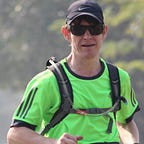Why planning is important to runners, and how I do it
As with the rest of life, our running can also benefit from a bit of planning. Part of the fun for me lies in planning my next race.
In the pandemic, many running events got cancelled or postponed. You are never quite sure when the event will happen. This can mess with a distance runner’s plans since it isn’t possible to be always ready to run your best race. It takes a long build-up, a peak, and then some tapering to be optimally prepared.
Planning also involves a host of other things like experimenting to get your diet and equipment right, when and how much and what type of speed work you should do, and simulating race conditions in your practice. Then there are the logistic aspects of it, including how and when you will travel and where you will stay.
Gerda Steyn, South African marathon and ultra-marathon runner, left nothing to chance in her build-up to the Olympics. It included high-altitude running in France to help her body become more efficient at carrying oxygen to her muscles. She did a stint in Dubai to get used to the heat in Tokyo. She regularly ran 400m and repeats (as many as 20 at a time, each around 70 seconds) as well as longer time trials to build speed-endurance. And this is just the part of the plan we can observe.
You have to think about your game plan. The question is what you can trust your body to do on race day. If you aim too low, you will feel you have not given your all. Too high, and you will start at a pace you will not sustain until the end. I usually err in this last way. I overestimated my fitness for the 6-hour stadium run so much that I ran 10k less than my plan. Finding that magic pace comes with experience as you run the long runs before the marathon and when you look at your previous track record for the distance. If you can run at a steady pace throughout the race and are totally spent at its end, you have timed your race perfectly.
In my personal best marathon, I was able to sustain the pace I planned until the end. I was elated with my 3:08, which I achieved at the Daily World marathon at the age of 48.
It is hard to do that for the marathon. Maybe because of the pain factor that always comes into it more than in shorter races. Willpower plays a massive role if your legs start cramping and giving out and you feel nauseous and dizzy. So there needs to be some mental preparation as well. The game plan helps to keep you focused even when it gets tough. Other mental strategies like a distraction, focusing on crowd support, visualizing the finish line, and dividing the race into shorter chunks can help you see it through.
My plan for the pandemic has been to keep a base level of fitness that I can quickly scale up when it becomes apparent that a particular race will happen. One has to guard against burnout, which can easily occur if you keep peak fitness for an extended time. I occasionally challenged myself or competed in virtual races just to keep the excitement going. But I listened to my body and didn’t push too hard. And so, I maintained that steady base while preventing burnout and injuries.
Now I plan to start planning again for being the best I can be in the races I will run!
Despite our best plans, it is also important to realize that we simply do not have all the data. The Bible says: “In their hearts humans plan their course, but the LORD establishes their steps.” (Proverbs 16:9)
This is a great comfort to me since reality often turns out very different from our plans. We know that God is the one that establishes our steps. Nothing is out of His control and separate from His master plan. We need to learn to trust Him even if we feel that everything is going wrong.
Keep running
Stephan
